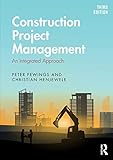Construction project management : an integrated approach / Peter Fewings and Christian Henjewele.
Material type: TextPublisher: Abingdon, Oxon ; New York : Routledge, Taylor & Francis Group, 2019Edition: Third editionDescription: xxvi, 498 pages : illustrations ; 26 cmContent type:
TextPublisher: Abingdon, Oxon ; New York : Routledge, Taylor & Francis Group, 2019Edition: Third editionDescription: xxvi, 498 pages : illustrations ; 26 cmContent type: - text
- unmediated
- volume
- 9780815358657
- 690.0684 FE.C 2019 23
- TH438 .F48 2019
| Item type | Current library | Collection | Call number | Status | Date due | Barcode | |
|---|---|---|---|---|---|---|---|
|
|
The Knowledge Hub Library | Engineering | 690.0684 FE.C 2019 (Browse shelf(Opens below)) | Not For Loan | 190024 |
Includes bibliographical references and index.
Project life cycle and success -- Building the client business case -- Project development and evaluation -- Construction procurement -- Planning and control -- Design management and value -- Project organisation and leadership -- Engineering the psycho-productive environment -- Engineering the production process -- Managing risk and value -- Project safety, health and the environment -- Sustainable delivery of construction projects -- Digital construction -- Quality and customer care -- Project close and systems improvement.
Construction Project Management: An Integrated Approach is a management approach to leading projects and the effective choice and use of project management tools and techniques. It seeks to push the boundaries of project management to take on board future needs and user issues. Integration of the construction project, meaning closer relations between the project team, the supply chain and the client, is long overdue; however, despite some signs of growth in this area, the industry nonetheless remains fragmented in its approach. The role of the project manager is to integrate diverse interests and unify objectives to achieve a common goal. This has now broadened to include a responsibility, on the parts of both client and team, to ensure that construction addresses current and future societal needs. From an economic perspective, a great deal of waste is connected with conflict, thus a holistic approach that increases the efficiency and effectiveness of the task at hand will inject energy into project management. This third edition now takes on board the impact of technology in building information modelling and other digitised technologies such as artificial intelligence. Together, they open up avenues for more direct and incisive action to test creative design, manufacture directly and communicate spontaneously and intuitively. In time, such technologies will change the role of project managers but will never take away their responsibility to be passionate about construction and to integrate the team. A new chapter has been added that considers future societal needs. This edition is also reordered to make the project life cycle and process chapters clearer.
There are no comments on this title.

